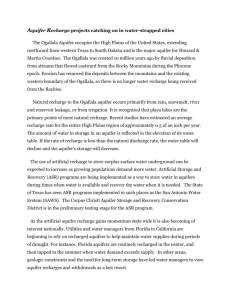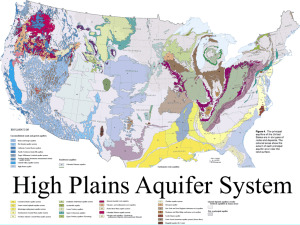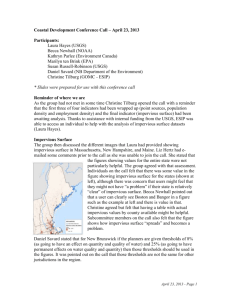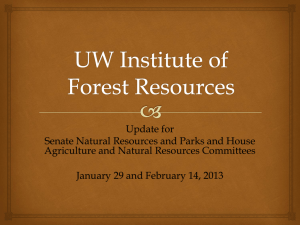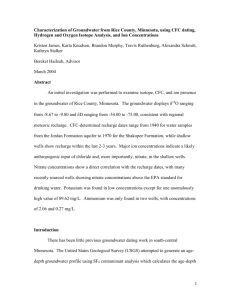Document
advertisement
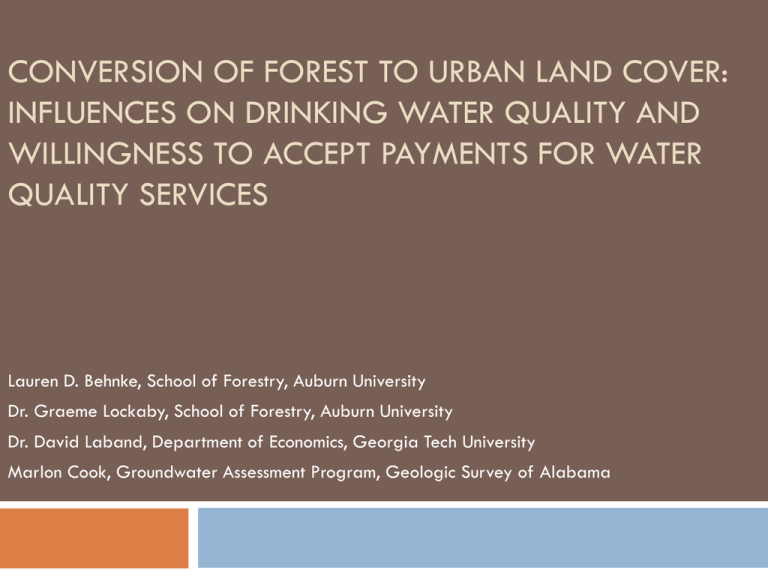
CONVERSION OF FOREST TO URBAN LAND COVER: INFLUENCES ON DRINKING WATER QUALITY AND WILLINGNESS TO ACCEPT PAYMENTS FOR WATER QUALITY SERVICES Lauren D. Behnke, School of Forestry, Auburn University Dr. Graeme Lockaby, School of Forestry, Auburn University Dr. David Laband, Department of Economics, Georgia Tech University Marlon Cook, Groundwater Assessment Program, Geologic Survey of Alabama Project Description Objectives Determine the effects of land use change in aquifer recharge zones on groundwater chemistry Identify the terms and conditions under which private, non-industrial landowners within aquifer recharge zone would be willing to participate in a program that would pay them to retain and/or expand the amount of forest cover on their property. Background Aquifers Source of drinking water Infiltration in recharge zones replenish aquifer Anthropogenic changes Land-use change Increased forest loss Increased urbanization Impacts on aquifer supply Increased pollutants Little known about effects http://imnh.isu.edu/digitalatlas/hydr/concepts/gwater /imgs/6comp.jpg Forecasted change in the proportion of counties in urban land use (www.rsr.fs.usda.gov/futures/) Projection of population change (change in people per square-mile) (www.rsr.fs.usda.gov/futures/) Water Quality Approach Water quality data from Utilities Board of the City of Trussville, AL from 19922008 8 wells were sampled (differed among samplings) Analyzed water chemistry http://ga.water.usgs.gov/edu/pictures/artesiansmall.jpg Water Quality Approach Recharge zones were delineated by Marlon Cook of the AL Geologic Survey AGS provided land use/land cover data Regression analyses were used to relate changes in impervious cover across time to water quality data Aquifer Recharge Zone – Trussville, AL Trussville Water Quality Assessment Percent land use/land cover data Type 1992 1997 2000 2006 2008 0.57 1.04 0.76 1.03 1.08 Vegetation 78.03 75.41 73.02 71.18 64.11 Impervious 21.40 23.55 26.22 27.79 34.81 Water Results of regression analyses for water quality indices and % impervious surface Water variables Nitrogen as nitrate R-square 0.5829 Pr>F 0.0458* Sodium 0.4016 0.0916 pH 0.3795 0.1039 Total alkalinity 0.5213 0.0431* Calcium 0.0058 0.8578 Chloride 0.2477 0.2094 Magnesium 0.0177 0.7537 Total Dissolved Solids 0.0369 0.6486 Turbidity 0.2676 0.2344 *significant at the 0.05 level The relationship between percent impervious surface in the recharge zone and N-NO3 in Trussville, AL well water 0.8 r2=0.5829 0.7 Nitrate (mg/L) 0.6 0.5 0.4 0.3 0.2 0.1 20 22 24 26 28 30 % Impervious surface Actual nitrate Predicted 32 34 36 The relationship between percent impervious surface in the recharge zone and alkalinity in Trussville, AL well water Water Quality Results Increasing N-NO3 and declining alkalinity as impervious surface increased from 1992 to 2008 Elevated N-NO3 is generally considered to be an indicator of water quality degradation although the levels observed in the Trussville wells (0.7 mg/L) do not approach the US EPA allowable limit for drinking water Water Quality Results These data suggest the chemistry of the water supply for of Trussville, AL is undergoing changes due to increased urbanization within the recharge zone Sources of N-NO3 include lawn fertilizers, sewer and septic systems, animal waste, and atmospheric deposition from anthropogenic sources Economic Analysis Identify terms and conditions under which private, non-industrial landowners would participate in a program that pays them to retain and/or expand the amount of forest cover on their property Mailed 204 surveys to individual owners of 10+ acres in Jefferson and St. Clair counties 24 returned Economic Analysis Method of Acquisition Years of Ownership Economic Analysis Number of Tracts Owned Total Acreage Owned Willingness to accept payment to retain forested acreage and acceptable annual payment after 1 year After 1 year Willingness to accept payment to retain forested acreage and acceptable annual payment after 3 and 5 years After 3 years After 5 years Cash versus tax credit as payment Key Findings Water Quality Findings Levels of nitrate were below EPA critical limits; but a significant, positive relationship was found between increasing development and rising levels of nitrate in wells http://www.charlottewilderness.org/img/Photos/Dry-Mesic%20Oak-Hickory%20Forest.jpg Economic Findings Landowners were willing to participate in a program: to retain forest cover for pay program of a short duration relatively low payment amounts As the desired contracting period lengthens, landowners react by: unwilling to participate under existing payments require higher annual, per-acre compensation No preference between cash or a tax credit Acknowledgements Alabama Association of RC&D Councils, Inc. Auburn University’s Center for Forest Sustainability Utilities Board of the City of Trussville, AL Alabama Geologic Survey Questions? http://eeekeverywhere.files.wordpress.com/2011/05/img_1967.jpg

